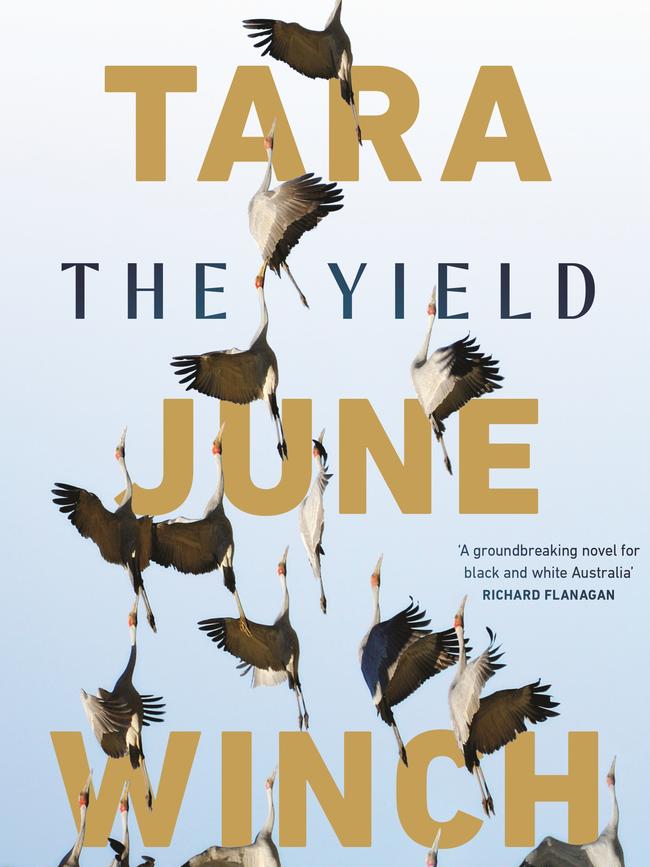Love letter conveys senses of loss
Tara June Winch’s haunting and meticulously researched novel is imbued with a ‘sadness like a still life’.

In The Yield, Tara June Winch’s first novel in more than a decade, the protagonist, August Gondiwindi, returns home after an extended overseas absence to mourn the loss of her “Poppy”, Albert Gondiwindi.
Winch, too, is returning to her Wiradjuri ancestral roots in this meticulously researched novel that blurs the boundaries between fact and fiction.
Set primarily in Massacre Plains, inspired by the towns of Wiradjuri country, the overarching story of The Yield belongs to August, who was raised in Massacre by her grandparents after her loving but neglectful parents were arrested.
August’s sister, Jedda, went missing as a teenager, leaving the cause of her disappearance and fate unknown.

This not-knowingness is psychologically paralysing for August, as she is unable to forget or move on. As Winch writes: “Life or death have finality, limbo doesn’t.”
Indeed, the Gondiwindis are defined by loss “their sadness like a still life”, and loss in its many iterations pervades this novel, loss of personal history, culture and language.
When August returns to her grandparents’ home, Prosperous Farm, she learns it has been acquired by a mining company and a tin mine will be opened soon.
Her grandmother, Elsie, must vacate the property, which has been an important local centre for Aboriginal people.
The influence of the mining company is sinister, promising jobs to the local community and arming children with activity packs: “bite-size, child-size, colourful, cheery brainwashing”. But August hopes a book her grandfather was writing will provide evidence of a connection to the land and allow indigenous interests to prevail over mining concerns.
The opening chapters are like a love letter to country, as Winch describes Prosperous, the sounds “encasing the world, in cicada friction and bird whip”. There are hints though of inequality between “Vegemite Valley … where the blackfellas in the government housing lived” and the “Minties”.
As a character, August is a sensitive and attuned observer, she is able to see “the little pulleys and gears inside people’s brains”. Winch’s writing here is more understated than usual, allowing the facts to speak without stylistic flourish.
Instead Winch experiments with an ambitious narrative structure, triangulating August’s current-day perspective with two others. There are also journal entries of Reverend Ferdinand Greenleaf from 1915 recording his interactions with Aboriginal people as he establishes a mission in Massacre Plains.
Across the course of the novel, the entries reveal Greenleaf’s increasing distress at how Aboriginal people are treated.
At one distressing moment, he comes across “several unfortunate Natives chained like so many dogs to each other”.
In another disturbing scene, he witnesses two young Aboriginal boys being flogged.
The Reverend, though, is an ambivalent character, for while his sympathy for Aboriginal people is genuine, the mission is itself ideological and he does nothing to intervene when Aboriginal children are removed from their families.
This ambiguity also has echoes in August’s account when she meets a white woman who arrives to protest against the mine despite having no connection with the land and who seems to fetishise August’s appearance.
The final narrative strand is the novel’s most powerful, capturing Albert’s efforts to produce a written record of his language. Albert’s personal history, his love affair with Elsie and his people’s symbiotic relationship with the land is recounted using the Wiradjuri language. In the author’s note, Winch acknowledges the research and preservation of Stan Grant and John Rudder on which Albert’s dictionary is based.
Albert is a keen storyteller and there is a deep vein of humour running through his book. He tells us, for example, about the “buugang”, the bogong moth and how the Godinwindi used to travel south for feasts on it which, “tasted a little like a pork chop, but more nutritious”.
What gives Albert’s book its power is how Winch invests the Wiradjuri language with new life through story. The symbolism of this is fictionalised when, at the end of the novel, Albert’s list of words is printed out and provided to local Aboriginal children.
Bruce Pascoe’s acclaimed book Dark Emu is cited as a source and there is evidence of it in the way Albert recounts the practices of his people in cultivating the land. For example, in his entry for “bimbayi” or “burnt grass”, Albert explains his ancestor’s carefully managed practice of burning back the edible grass to allow for its cultivation. It is also in Albert’s strand of the novel we discover the fate of Jedda, completing a circle of sorts.
There is a haunting scene towards the end when August and her aunt travel to the city to inspect ancestral artefacts.
When they visit the museum they see a “beautifully stitched possum-skin cloak” with kangaroos painted on the inside “whose bodies looked curved, as if they were still in the womb”.
At the same time, a group of distracted schoolchildren walk past saying “cool” and “weird”.
It’s a deeply ambivalent moment and captures the tensions Winch is exploring in this quietly magnificent novel.
The problem isn’t just the past, Winch suggests, but with its lack of acknowledgment in the present day. Indeed, there are echoes of past injustices throughout The Yield: the removal of Aboriginal children, the frontier wars and indentured labour. That is why the tin mine is such an apt metaphor, creating a “big hole” in a place where there was once love and cohesion.
A similar image is used by Ali Cobby Eckermann in her poem Unearth. “Excavation holes are dug in our minds,” Eckermann writes, capturing how past violence constantly reasserts itself in the present.
Winch’s novel is similarly elegiac. As Albert Gondiwindi tells us on the first page the Wiradjuri word for Australia is “ngurambang”: “If you say it right it hits the back of your mouth and you should taste blood in your words.”
If there is hope in this haunting novel it comes, as August learns, in the form of protest and dissent.
Gretchen Shirm is a writer and critic.
The Yield
By Tara June Winch. Hamish Hamilton, 352pp, $32.99



To join the conversation, please log in. Don't have an account? Register
Join the conversation, you are commenting as Logout